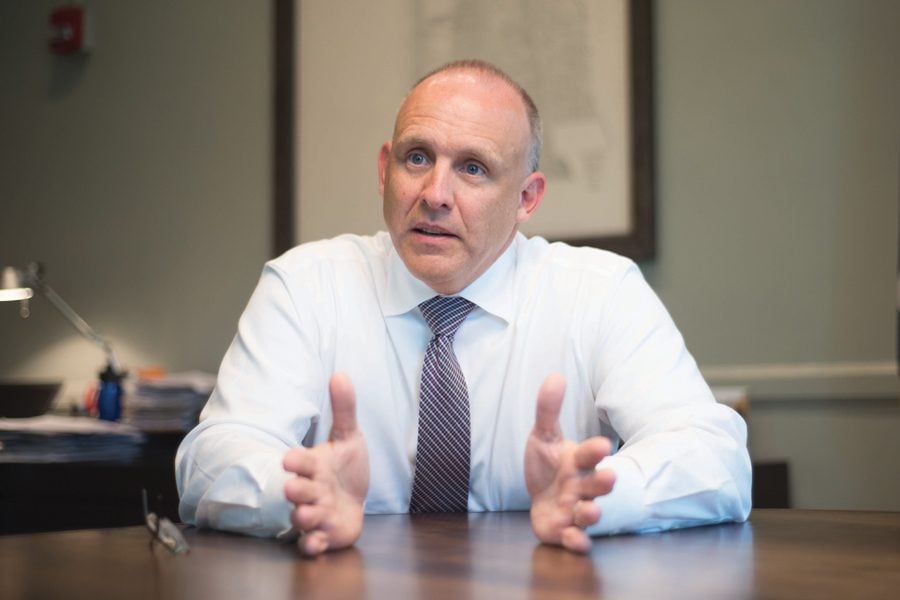After ‘frustrating’ and confusing 2017 election, Evanston must reexamine primary rules
Daily file photo by Alison Albelda
Mayor Steve Hagerty in his office.
October 23, 2019
The last municipal election cycle in Evanston was fraught with confusion about filing dates, primaries and an old referendum that got lost in the shuffle. Now, as the 2021 election creeps closer, Evanston officials must find a way to avoid the chaos and sort out the city’s primary policies.
“Unequivocally, we need to make sure our rules are as clear as possible,” said Mayor Steve Hagerty, who ran back in 2017. “We need to be clear for all future candidates that are running for office here, so that no one is removed from the ballot on a technicality.”
Candidates for the 2017 election were slated to file their paperwork in December 2016, in anticipation of a general election in April. However, one candidate — former 9th Ward alderman Brian Miller, who was then launching a bid for mayor — submitted his filing paperwork in November, a full month earlier than city officials had specified.
He cited a referendum passed in Evanston in 1992 which requires a primary to be held in mayoral races with two or more candidates. In 2017, there were five mayoral candidates on the ballot. Once Miller submitted his paperwork, three other candidates also rushed to file: Hagerty, former Evanston Township supervisor Gary Gaspard and former 6th Ward alderman Mark Tendam.
Hagerty said he immediately turned to an election lawyer to better understand what was going on with the filing process, and other candidates did the same. A supporter of Miller’s, William Arnt, sought to kick a number of candidates off the ballot for not filing for the February primary, but his objections were overruled by the board of elections.
“It was frustrating,” Hagerty told The Daily earlier this month. “It was frustrating as a candidate. You just want to follow the rules, and you want the rules to be understandable, and you want somebody to explain them to you.”
The last candidate, lawyer Jeff Smith, ended up filing in December after then-City Clerk Rodney Greene announced the city would keep two filing dates and hold a primary for the election based on Illinois law, which requires a primary for races with four or more candidates. Smith himself also challenged the filings of the other four candidates; his objections were thrown out by the board in late December.
With the primary sorted and scheduled, city officials could turn to the larger problem at hand: the 1992 referendum Miller referenced.
While officials found plenty of documentation of the referendum having happened — and passing 15,116 to 12,506, as per The Daily’s reporting that year — in the form of news clippings, neither the actual documents nor the confirmation that is typically sent on to the County Clerk’s Office have surfaced.
There was also no indication that the referendum had ever been enforced after its passing. Former mayor Elizabeth Tisdahl notably won a four-candidate election during her first mayoral bid in 2009. It was held without a primary.
Back in 2018, Hagerty called for the city’s law department to review the 2017 election and primary rules, saying at the time that it “would be a complete embarrassment to all of us up here if we didn’t address it now.”
Since then, no concrete action has been taken. The issue resurfaced at a Rules Committee meeting on Oct. 7, when members realized that another longstanding practice in Evanston — holding non-partisan elections — had not been formally codified. During that meeting, aldermen revisited the 2017 election, and must now find a way to move forward with the 1992 referendum still lost in the shuffle.
City Clerk Devon Reid said Council must pass a resolution by the end of the year to put a referendum on the ballot for the March 17, 2020 election, during which residents would decide on whether to restructure their mayoral election practices.
Reid and Hagerty have both said it is imperative for the issue to be sorted out by the next election cycle. Reid is advocating for an election model similar to the one in Chicago — a consolidated election with a runoff, where unless a candidate gets over 50 percent of the vote during the February primary, the top two move on to the general election in April.
Hagerty said he is still unsure about what system he would prefer going forward, but that the issue needs to be “squared away” come December.
Email: [email protected]
Twitter: @kristinakarisch












